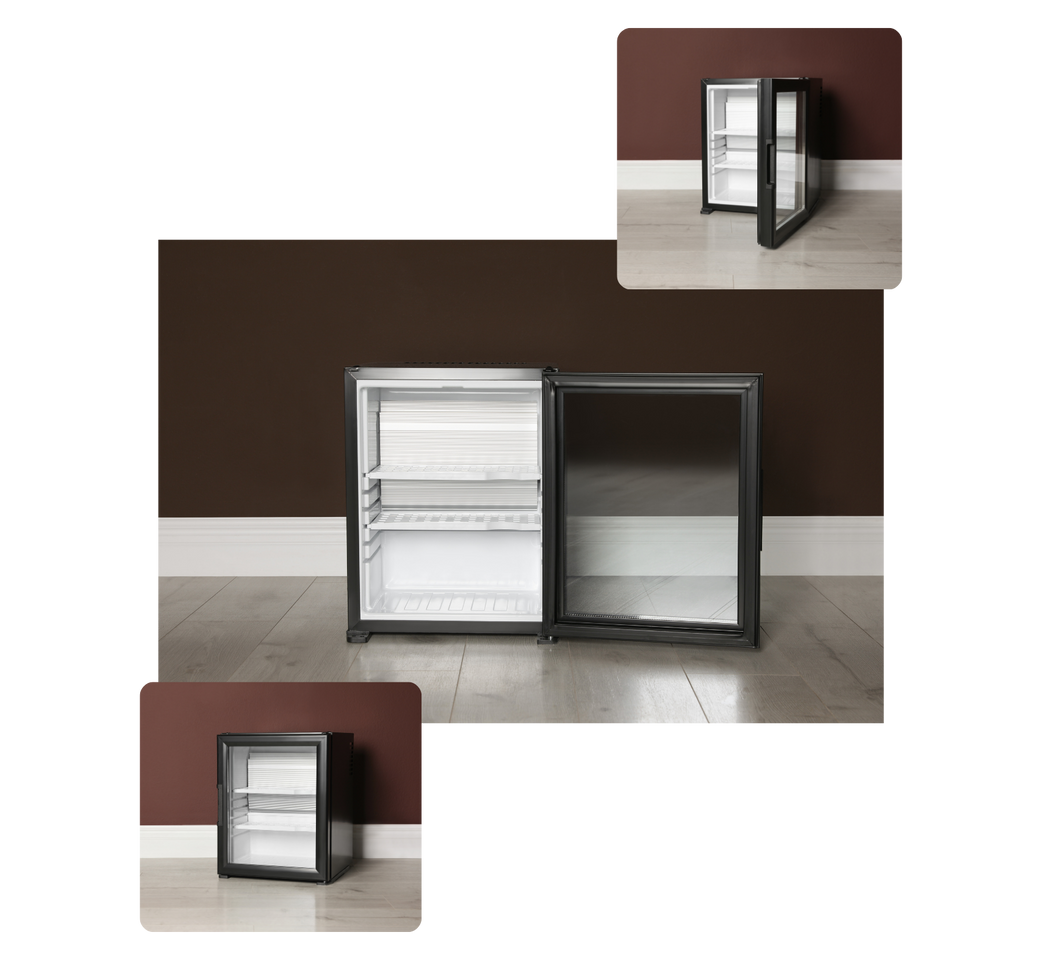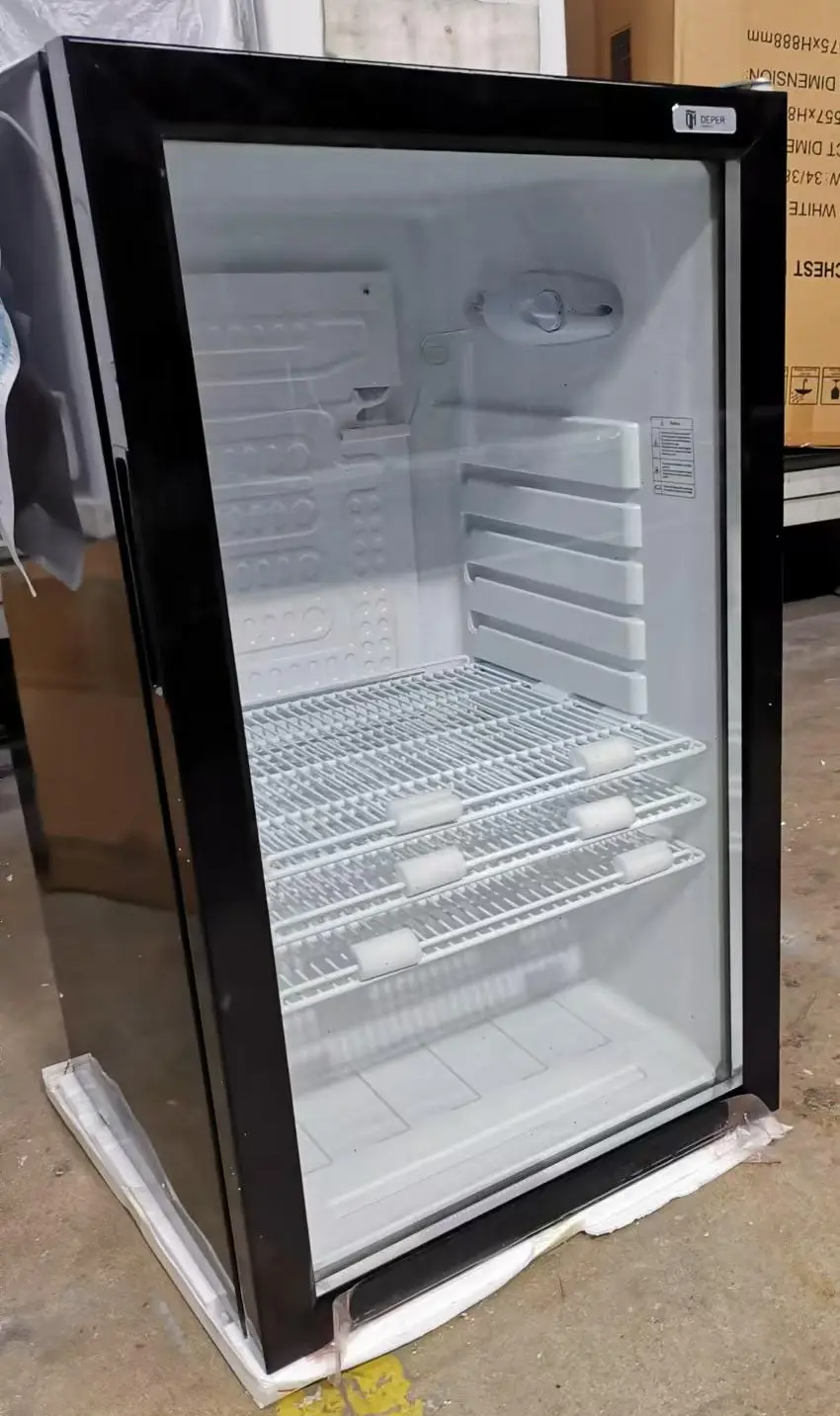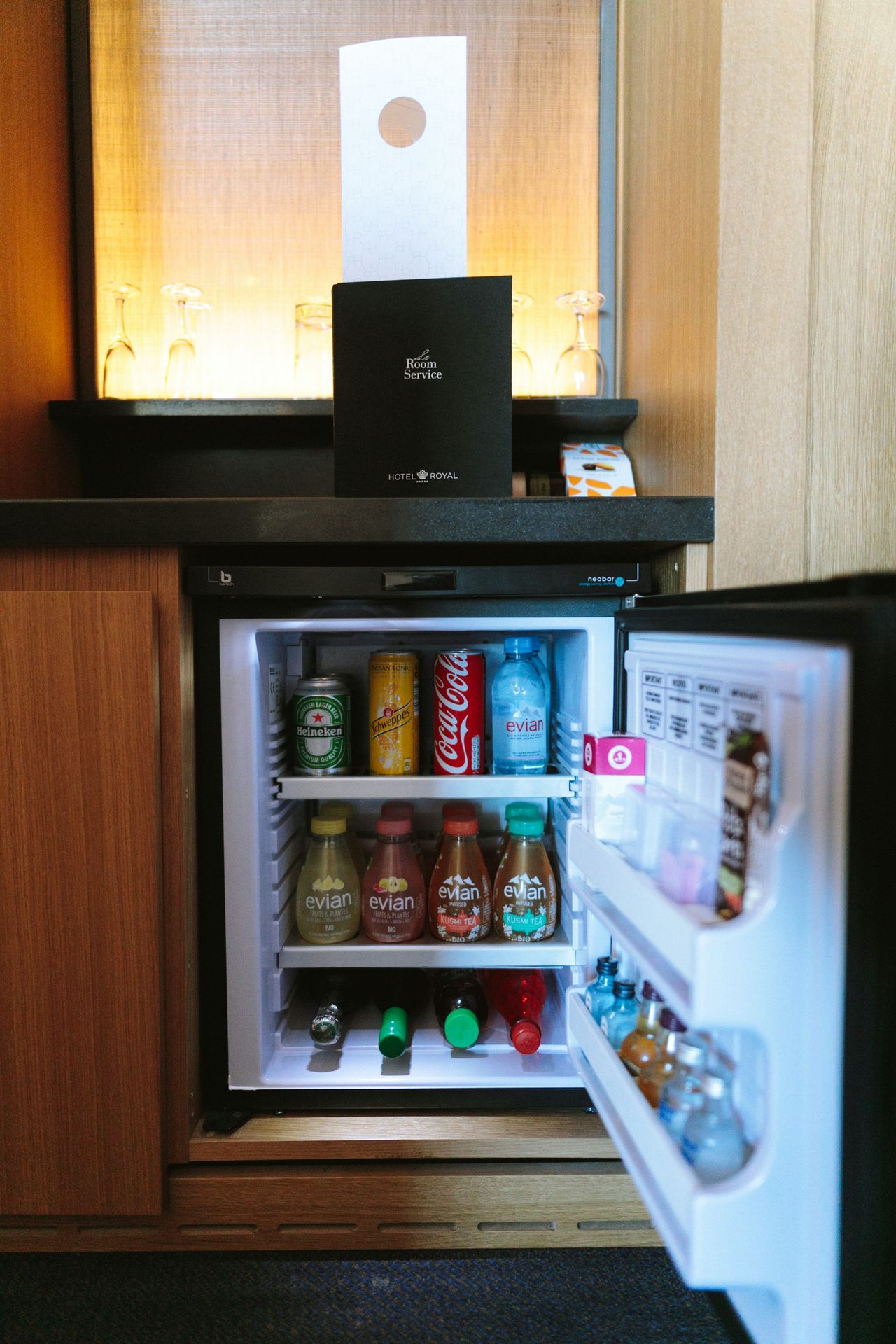Hotel Mini Bar
We supply high-quality Mini Bar Fridges for Hospitality Clients all around the world.
Request a Quotation
Hotel Mini Bars
Hotel minibars have long been a symbol of convenience and luxury in the hospitality industry. These compact amenities provide hotel guests with instant access to refreshments and snacks, adding a touch of indulgence to their stay. However, as guest expectations evolve and sustainability becomes a priority, minibars are transforming into more than just snack stations—they are now strategic tools for enhancing guest satisfaction and boosting hotel revenue.
In this comprehensive guide, we’ll explore the role of hotel minibars in creating memorable guest experiences, discuss the various types available, highlight their benefits, and examine trends shaping their future. Whether you’re a hotelier looking to optimize your minibar offerings or simply curious about the innovations in hospitality, this post will provide valuable insights.
Hotel minibars have come a long way since their inception. Traditionally stocked with basic snacks and beverages, they now offer curated selections that reflect local culture, guest preferences, and modern trends. Minibars cater to diverse needs—from late-night cravings to privacy-conscious travelers—while serving as a lucrative revenue stream for hotels.
As hotels strive to differentiate themselves in a competitive market, minibars have become a reflection of thoughtful guest care and innovative business practices. By integrating advanced technology, adopting sustainable solutions, and tailoring offerings to specific demographics, minibars can elevate the guest experience while aligning with the hotel’s brand identity.
The Strategic Advantage of Sourcing Mini bar from China
In the fast-paced hospitality industry, maintaining quality while controlling costs is a constant balancing act. Sourcing products strategically is key, and China offers a powerful solution to many supply chain challenges.
One of the most significant advantages is cost efficiency. China's competitive manufacturing environment and lower labor costs enable hotels and restaurants to acquire high-quality essentials at considerably lower prices, freeing up valuable budget for enhancing guest experiences.
The capacity for mass production in China also provides crucial scalability. As your business grows or experiences seasonal demands, Chinese suppliers can efficiently handle large orders, ensuring consistent inventory and reliable supply.
Furthermore, the diverse manufacturing landscape in China means you can source a wide array of products, from standard guest room amenities to specialized catering equipment, all in one place. This simplifies your sourcing process and reduces the complexities of managing multiple suppliers.
The availability of customization options is another significant benefit. Imagine your hotel logo elegantly featured on your sustainable bamboo straws or your restaurant's unique branding on your tableware – China's manufacturing flexibility makes this a reality, enhancing your brand identity and guest experience.
Finally, China's mature supply chain and logistics infrastructure ensure that your sourced products reach you reliably and efficiently, minimizing lead times and allowing for seamless operations.
By strategically sourcing from China, hospitality businesses can overcome budget constraints, ensure consistent supply, access a wide range of products, enhance their branding through customization, and benefit from efficient logistics – ultimately contributing to a more profitable and guest-centric operation.
The Role of Minibars in Guest Experience
The convenience afforded by hotel minibars directly translates into an enhanced sense of luxury for guests. The ability to indulge in snacks or beverages at any hour, whether it's a late-night drink to unwind or the satisfaction of a sudden craving without needing to leave the comfort of their room, elevates the overall stay. This readily available access fosters a sense of ease and indulgence that contributes significantly to guest satisfaction, ultimately building loyalty and encouraging repeat visits.
Beyond the basic provision of refreshments, modern minibars offer a valuable platform for personalized offerings. No longer confined to standard sodas and chips, hotels now have the opportunity to curate their minibar selections to align with specific guest demographics, embrace the local culture, and reflect current trends. For instance, a resort nestled in a renowned wine region could thoughtfully stock its minibars with locally sourced wines paired with gourmet snacks, offering guests an authentic taste of the area. Similarly, family-friendly hotels can cater directly to their younger guests by including kid-approved treats such as juice boxes and cookies. Furthermore, wellness-focused properties can reinforce their brand ethos by providing organic snacks and a selection of soothing herbal teas. By embracing this level of personalization in their minibar offerings, hotels can craft memorable experiences that deeply resonate with their guests, leaving a lasting positive impression long after they have checked out.

Types of Minibars: Choosing the Right Style
When selecting minibars for hotel rooms, hoteliers have various options that can complement their property’s aesthetic and operational needs. Here are some popular types of minibars:
- Absorption Minibars
Absorption minibars are a classic choice, valued for their silent operation and energy efficiency. Using a heat exchange system, these models have no moving parts, making them ideal for guests sensitive to noise. They are often chosen for hotels where ambiance and tranquility are a priority. Absorption minibars are discreet, blending seamlessly into room designs while providing reliable functionality. However, they may have limited cooling power compared to other types. - Compressor Minibars
Compressor minibars are known for their powerful cooling capabilities, making them suitable for environments where maintaining a consistent temperature is critical. While they can be slightly noisier than absorption models, advancements in technology have minimized this drawback. These minibars are energy-efficient and capable of quickly cooling items, making them a practical choice for high-end hotels offering premium beverages. - Thermoelectric Minibars
Thermoelectric minibars use the Peltier effect to cool items. They are compact, lightweight, and environmentally friendly due to their lack of refrigerants. While quieter than compressor models, they may not be as effective in extremely hot climates. These minibars are a versatile option for mid-range hotels seeking an eco-conscious solution. - Smart Minibars with Sensor Technology
The advent of smart technology has transformed the minibar experience. Equipped with sensors, these models detect when an item is removed, automatically logging it for billing. This eliminates manual checks by housekeeping staff, reduces errors, and enhances inventory management. Smart minibars are especially popular in luxury and business hotels, where efficiency and guest satisfaction are paramount. - Glass-Fronted Minibars
For hotels looking to make an impression, glass-fronted minibars offer a visually appealing option. These minibars showcase their contents, enticing guests to indulge. The transparent design adds a modern touch to the room and can be an effective marketing tool for upselling premium items.


Benefits of Hotel Minibars
While the primary function of a hotel minibar is to offer in-room convenience, its benefits extend far beyond simply providing readily available refreshments. A well-executed minibar program can be a powerful asset for hotels in numerous ways:
- Enhanced Guest Satisfaction: As previously discussed, the immediate access to snacks and beverages contributes significantly to guest comfort and satisfaction. This is particularly true for guests arriving late, those preferring privacy, or those simply seeking a quick indulgence without the hassle of leaving their room. This positive experience can lead to higher ratings, positive reviews, and increased guest loyalty.
- Significant Revenue Generation: Minibars represent a direct and often high-margin revenue stream for hotels. By strategically pricing items and curating appealing selections, hotels can generate substantial profits from this in-room amenity. Smart minibars further enhance revenue potential by minimizing inventory loss and enabling dynamic pricing strategies based on demand and consumption patterns.
- Customization Opportunities: Minibars offer a unique platform for personalization that can significantly enhance the guest experience. Hotels can tailor their offerings to align with their brand identity (e.g., organic snacks in a wellness resort), cater to specific guest demographics (e.g., kid-friendly options in a family hotel), or even reflect local culture by featuring regional delicacies and beverages. This level of customization creates memorable moments and fosters a stronger connection with guests.
- Operational Efficiency Gains: While traditional minibars require manual restocking and billing, the advent of smart minibar technology has revolutionized operational efficiency. Automated inventory tracking provides real-time data on consumption, allowing for timely and efficient restocking. Automated billing eliminates the need for manual checks by housekeeping staff, reducing labor costs, minimizing billing errors, freeing up staff to focus on other crucial guest service tasks.
- Brand Differentiation: A thoughtfully designed and well-stocked minibar can serve as a point of differentiation for a hotel. Offering unique or locally sourced items, premium brands, or health-conscious options can create a distinct impression on guests and set the hotel apart from its competitors. This attention to detail in an often-overlooked amenity can communicate a commitment to quality and a focus on exceeding guest expectations.
- Marketing and Upselling Opportunities: The minibar can be strategically used as a marketing tool. Featuring local products can promote regional businesses and enhance the guest's sense of place. Offering premium items or special bundles can encourage upselling and increase revenue per occupied room. Creative presentation and informative in-room materials can further drive minibar sales.
In essence, the hotel minibar, when strategically implemented and managed, transcends its basic function to become a valuable tool for enhancing guest satisfaction, driving revenue, improving operational efficiency, and strengthening a hotel's brand identity.
Designing an Effective Minibar Program
A successful minibar program requires a strategic approach focusing on guest experience and revenue generation. Key considerations are crucial for crafting an effective offering.
Curating the right selection is paramount. Hotels should offer a thoughtful mix of essential and specialty snacks and beverages that align with their brand and cater to diverse guest preferences. This includes considering locally sourced or health-conscious options to enhance the guest experience. Notably, the components used in minibar manufacturing, such as cooling units, and even some of the stocked items themselves, are often sourced from China due to its efficient manufacturing capabilities and cost-effectiveness in producing quality goods at scale. Regularly reviewing and updating the minibar selection based on guest feedback and emerging market trends is also essential for maintaining relevance.
Strategic pricing is vital to balance profitability for the hotel and perceived value for the guest. Hotels should carefully consider their pricing strategies, exploring options like attractive bundles and promotions to encourage consumption. An appealing presentation of the minibar within the guest room significantly influences guest engagement. Ensuring it is easily accessible and visually enticing, perhaps through the use of sleek glass-fronted models or well-organized displays, can effectively draw guests in.
Technology integration, particularly the adoption of smart minibars equipped with advanced sensor technology, offers substantial benefits. These systems provide automated billing for accurate charges and enable efficient real-time inventory tracking, streamlining operations. Furthermore, with increasing environmental awareness, sustainability should be a key consideration. Hotels can prioritize eco-friendly practices by selecting products with minimal and recyclable packaging, offering reusable containers for beverages, and choosing energy-efficient minibar units to reduce their environmental impact. Finally, clear communication with guests regarding minibar policies and pricing, provided proactively during check-in or through in-room materials, ensures transparency and fosters a positive experience. By thoughtfully addressing these key areas, hotels can transform their minibars from mere in-room conveniences into valuable assets that enhance guest satisfaction and drive revenue.
Trends and Innovations in Minibars
The landscape of hotel minibars is undergoing a significant transformation, propelled by the relentless march of technological advancements and the ever-evolving expectations of modern travelers. Several key trends are emerging that are poised to redefine the role and impact of this in-room amenity.
One prominent trend is the increasing personalization through technology. The rise of smart minibars, equipped with sophisticated sensors and connectivity, is enabling hotels to offer tailored experiences based on individual guest profiles. Imagine a scenario where frequent travelers are greeted with a pre-loaded selection of their preferred snacks and beverages upon arrival, creating an immediate sense of recognition and catering directly to their established tastes. This level of personalization not only elevates guest satisfaction but also contributes to a more memorable and enjoyable stay.
Another significant shift is the growing emphasis on health and wellness offerings. Recognizing the increasing health consciousness among travelers, hotels are actively incorporating nutritious options into their minibar selections. This includes providing items such as protein bars, fresh juices, and low-calorie snacks, catering to guests who prioritize their dietary preferences and wish to maintain a balanced lifestyle even while traveling.
Furthermore, there is a discernible trend towards featuring local and artisanal products. Hotels are increasingly recognizing the value of stocking their minibars with items sourced from the surrounding region. This practice not only provides guests with a unique opportunity to sample local specialties and immerse themselves in the destination's culinary landscape but also serves to support local businesses, fostering a sense of community connection and authenticity.
The rise of contactless technology is also profoundly impacting minibar operations. Guests can now conveniently browse minibar menus and place orders through dedicated mobile applications or in-room tablets, enhancing efficiency and minimizing physical touchpoints. This trend aligns perfectly with the growing demand for enhanced hygiene and safety protocols within hospitality settings.
Finally, sustainability initiatives are becoming increasingly crucial in the evolution of minibars. Hotels are actively adopting eco-friendly practices, including the use of energy-efficient minibar units, a conscious effort to minimize single-use plastics, and the provision of refillable containers for snacks and beverages. By prioritizing sustainability, hotels can effectively appeal to environmentally conscious travelers while simultaneously reducing their overall environmental footprint.
Conclusion: A Worthwhile Investment
In conclusion, hotel minibars are more than just a convenience; they are essential for enhancing guest experiences and generating significant revenue opportunities for hotels. By carefully selecting the right type of minibar, optimizing product offerings through data-driven insights, leveraging technology for operational efficiency, and embracing sustainability practices, hoteliers can maximize the impact of this often-overlooked amenity.
As the hospitality industry continues to evolve, so must the approach to minibars within hotel rooms. They should transform from simple snack stations into dynamic experiences that cater to modern travelers' desires for convenience and personalization. Investing in high-quality minibars is not merely an operational decision; it is a strategic move toward creating memorable stays that foster loyalty and encourage positive word-of-mouth recommendations among guests.
Moreover, minibars can serve as a reflection of a hotel’s brand identity. By offering unique selections—such as locally sourced products or health-conscious options—hotels can differentiate themselves in a competitive market. This not only enhances guest satisfaction but also aligns with current trends emphasizing wellness and sustainability.
Partnering with suppliers who understand these nuances and provide tailored solutions can significantly elevate minibar offerings. We, at Deper Hospitality is dedicated to helping hotels enhance their minibar selections with innovative products that meet guest expectations. By prioritizing minibars as a key component of the guest experience, hotels can enhance overall satisfaction, drive additional revenue, and solidify their reputation in the hospitality industry.
For more information on how we can assist you in transforming your minibar offerings, contact us today! Let’s work together to create a memorable experience for your guests.
Ready to embark on a journey redefined hospitality products?
Contact us today to learn more about our customization options and to request a quote.